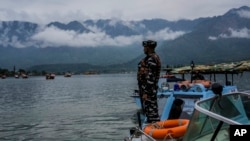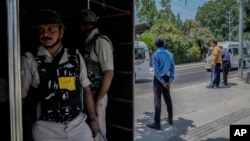Tranquil rides on the scenic Dal Lake in intricately carved wooden shikara boats. Traditional dance to the beat of local music. Learning the hook step with actor Ram Charan to “Naatu Naatu,” this year’s Oscar-winning song featuring the Indian movie star.
All are part of New Delhi’s effort to welcome G-20 delegates to its part of Kashmir, the Himalayan territory disputed with its neighbor, Pakistan.
As India attempted to exude a sense of normalcy by hosting the third G-20 tourism working group meeting in Kashmir amid heavy security and Pakistani Foreign Minister Bilawal Bhutto Zardari conducted a protest campaign on his side of the divided territory, the status of the 75-year-old conflict looked murky.
Expressing outrage, Bhutto Zardari called India’s decision to hold the first major event on its side of Kashmir since revoking its special autonomy almost four years ago a “display of arrogance.”
“That was India sending a message to the world that we don’t believe in international law," Bhutto Zardari told VOA. “We can violate international [United Nations] Security Council Resolutions, and there’s nothing you can do about it. And by holding the event in occupied Kashmir today, they are sending the same message to their participants and to the international world.”
This year, as the president of the G-20 — a group of 19 of the world’s biggest economies plus the European Union — New Delhi is hosting nearly 100 events across the country.
India’s Minister of External Affairs S. Jaishankar rejected Pakistan’s objections to hosting the tourism conference in the disputed territory’s summer capital, Srinagar.
Pakistan has “nothing to do with the G-20, nothing to do with even Srinagar and Kashmir,” Jaishankar told reporters early this month.
The South Asian nuclear rivals have fought three wars over the disputed region since gaining independence from Britain in 1947. A 1948 U.N Security Council resolution that outlines a process to resolve the issue has never been fully implemented.
Kamran Bokhari, a senior director at the Washington-based New Lines Institute for Strategy and Policy, told VOA that currently, the Kashmir conflict has little relevance internationally because it is “unresolvable” and “mired in a stalemate.”
“The only reason that it has any importance is because it is between two nuclear-armed historic rivals in the most densely populated region of the world,” Bokhari said in written comments.
Former Indian diplomat Manju Seth called the dispute a matter of perception.
“I think disputed as far as who is concerned, you know? In our view, it is no longer disputed, and it's ... always been a part of our country,” Seth told VOA, reiterating New Delhi’s stance.
While most countries sent just local staff to the tourism conference, Pakistani allies China, Saudi Arabia, Egypt and Turkey skipped the event. However, only China, which also has a border dispute with neighboring India, issued a condemnation.
“[This] says something about how the issue itself is defined by the international community, contrary to what India claims [it is seen] as an international dispute,” Pakistan’s former ambassador to the U.N., Maleeha Lodhi, told VOA.
She rejected the notion that attendance by dozens of G-20 delegates was a quiet endorsement of India’s position on Kashmir, instead blaming global politics for the continuation of the decades-old conflict.
“The fact that the … Security Council has been unable to implement its own resolutions on Kashmir … is a reflection of big power politics,” said Lodhi.
Fernand de Varennes, U.N. special rapporteur on minority issues, recently criticized the meeting, saying that by hosting the session in Kashmir, “India is seeking to normalize what some have described as a military occupation.”
Reeling from decades of separatist militancy that has killed tens of thousands, Indian-administered Kashmir is among the most heavily militarized parts of the world. India accuses Pakistan of supporting the insurgency, but Pakistan says it only provides moral support to the separatist cause.
Security was bolstered for the event, with New Delhi deploying National Security Guards, marine commandos and Border Security Force personnel to join dedicated police units. As the event drew closer, though, security moved into the background to give a sense of normalcy amid reports of mass detentions.
Bokhari said the fact the G-20 is happening in Kashmir shows the most powerful nations have accepted New Delhi’s claims the security situation has improved.
“Obviously, India has been able to demonstrate that it has things more or less under control,” he said.
According to India’s minister of tourism, G. Kishan Reddy, a record 18.4 million tourists visited Kashmir in 2022, with the government expecting that number to grow.
However, only 20,000 of the millions of tourists were foreign visitors, according to local officials.
As India works to make the conflict-riddled scenic valley welcoming for globe-trotters, Lodhi notes, “Pakistan has no choice but to continue to internationalize the issue, to keep raising it at key forums.”
New Delhi says it will not discuss the issue with Pakistan until Islamabad stops supporting terrorist activities against it, a charge Pakistan denies.
“We would like to discuss … the status of what is [the part of Kashmir’] with Pakistan, which was originally a part of India,” Seth said.
Earlier this month, Jaishankar told reporters, “There is only one issue to discuss on Kashmir, that is when does Pakistan vacate its illegal occupation of Pakistan-occupied Kashmir.”
Pakistan calls its part of Kashmir, Azad or Free Kashmir.
Some information for this story came from Reuters.











